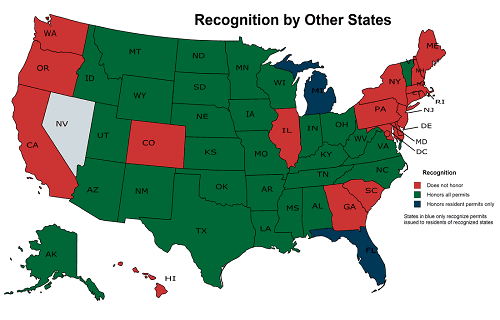Concealed Carry Laws by State

Concealed Carry Laws Overview
Concealed carry laws allow individuals to carry a concealed firearm in public. These laws vary by state and can range from being very permissive to very restrictive. Some states require individuals to obtain a permit to carry a concealed firearm, while others have constitutional carry laws that do not require a permit.
Permissive States
Permissive states have laws that are very favorable to gun owners. These states typically have shall-issue laws, which means that individuals who meet certain criteria, such as passing a background check and completing a training course, are granted a concealed carry permit. Permissive states also allow open carry of firearms without a permit in some circumstances.
Examples of Permissive States:
- Texas
- Florida
- Arizona
Restrictive States
Restrictive states have laws that make it difficult for individuals to obtain a concealed carry permit. These states may have may-issue laws, which means that the decision to grant a permit is left up to the discretion of local authorities. Restrictive states may also prohibit open carry of firearms without a permit.
Examples of Restrictive States:
- California
- New York
- New Jersey
How to Obtain a Concealed Carry Permit
If you live in a state that requires a permit to carry a concealed firearm, the process for obtaining a permit will vary. In general, you will need to complete a training course, pass a background check, and submit an application to your local law enforcement agency. Once you have been approved, you will receive your permit in the mail.
Step-by-Step Guide to Obtaining a Concealed Carry Permit
- Research the concealed carry laws in your state to determine if you are eligible to apply for a permit.
- Complete a training course that meets the requirements set forth by your state.
- Submit an application to your local law enforcement agency.
- Undergo a background check.
- Wait for your permit to arrive in the mail.
Pros and Cons of Concealed Carry
There are both pros and cons to carrying a concealed firearm. It is important for gun owners to consider these factors before deciding to carry a firearm.
Pros of Concealed Carry
- Provides a means of self-defense
- Gives individuals a greater sense of security
- Allows individuals to protect themselves and others in dangerous situations
Cons of Concealed Carry
- Increases the risk of accidental shootings
- May escalate a situation if the firearm is used
- Can cause individuals to become overly reliant on their firearm for protection
FAQ
Q: Can I carry a concealed firearm in any state?
A: No, concealed carry laws vary by state and it is important to understand the laws in the state you plan on carrying your firearm in.
Q: Do I need a permit to carry a concealed firearm?
A: It depends on the state you live in. Some states have constitutional carry laws that do not require a permit, while others require a permit.
Q: Can I carry a concealed firearm in a gun-free zone?
A: No, it is illegal to carry a concealed firearm in a gun-free zone.
Q: What is the penalty for carrying a concealed firearm without a permit?
A: The penalty for carrying a concealed firearm without a permit varies by state, but can include fines, imprisonment, and the revocation of your right to own firearms.
In conclusion, it is important for gun owners to understand the concealed carry laws by state and to follow the proper procedures for obtaining a permit. While there are pros and cons to carrying a concealed firearm, it is ultimately up to the individual to decide if it is the right choice for them.
